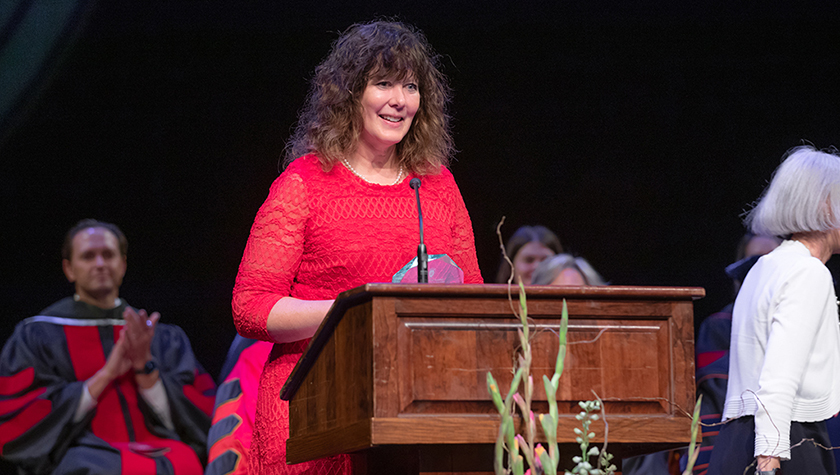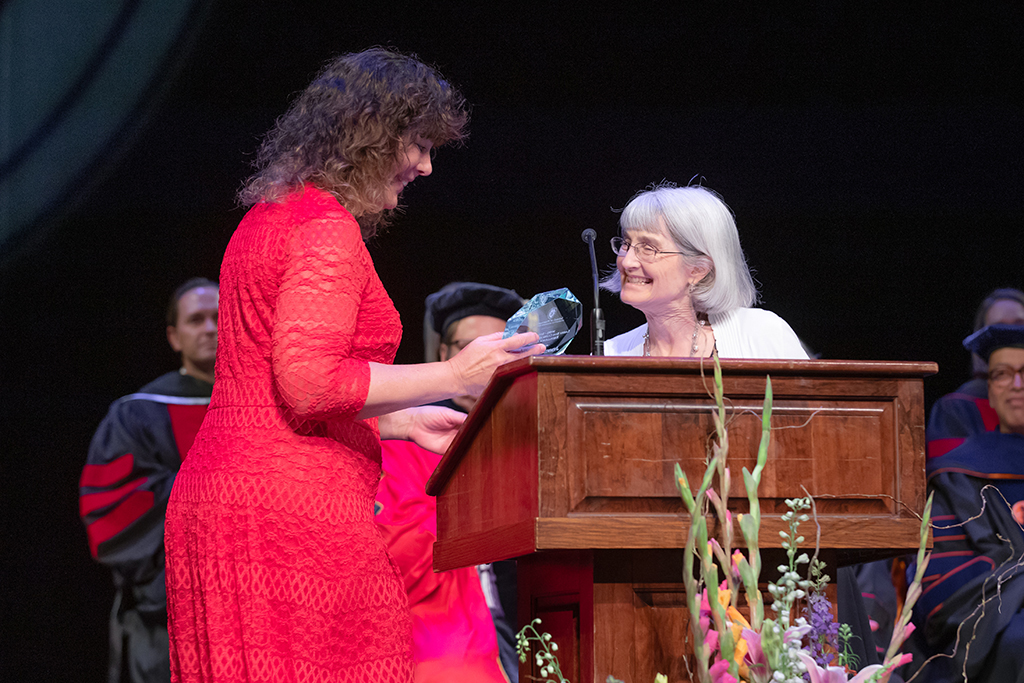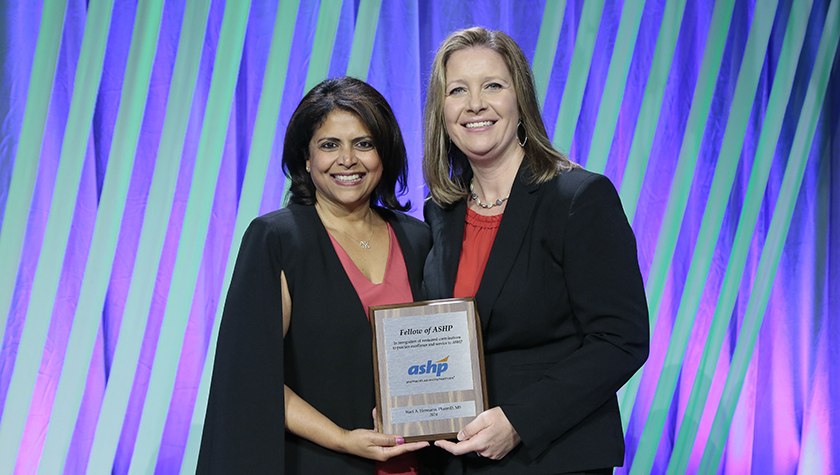
Moran, the ‘pharmacist detective,’ is recognized for providing student pharmacists with superb precepting at Children’s Wisconsin
By Katie Ginder-Vogel
As an oncology/bone marrow transplant (BMT) and general pediatric pharmacist at Children’s Wisconsin in Milwaukee, Jenny Moran (BS ’88) is inspired by her pediatric patients, who can be bedridden one day and playing joyfully in the hall — IV pole in tow — the next.
As a preceptor for the University of Wisconsin–Madison School of Pharmacy, Moran is motivated by the PharmD students completing their clinical rotations, who continually challenge assumptions and keep her knowledge up to date.
For both, she goes the extra mile — tracking down answers, communicating with empathy and clarity, and creating a supportive environment where questions are welcomed.
“I learn more from my students than they learn from me, which keeps me up to date on everything.”
—Jenny Moran
Moran’s outstanding work as a preceptor has earned her the School of Pharmacy’s 2024 Larry Boh APPE Clinical Instructor Excellence Award. This student-nominated award recognizes preceptors who demonstrate a dedication to instruction and excellent communication and professionalism during PharmD students’ fourth-year Advanced Pharmacy Practice Experiences (APPEs).
“I am completely honored and astounded,” she says. “When you look at UW’s program, there are a huge number of preceptors, and I happen to be in a specialty area, so the number of students I get each year, compared to some preceptors, is not that many. I’m blown away.”
Individualized precepting
As a preceptor, Moran supervises PharmD students in general pediatrics.
“What I love about that is that the patients come in with an acute situation, and usually we can give them some medication to cure that disease and send them home to be a happy, healthy child again,” she says. “I precept about two UW students at a time, which I like, because they learn from each other.”
Moran, who has directly precepted more than 350 APPE students to date, begins by getting to know her pharmacy students and exposing them to the types of medications, diseases, and patients they are likely to encounter in their pharmacy careers, no matter what area of pharmacy they choose.
“Each student who comes through is unique in their background and career goals, so I try to work with students and look at the patients they’ll see in their future careers, as well as the types of medications, diseases, and problems they’ll deal with in their chosen career,” she says. “Even though most students won’t be pediatric pharmacists, they will run into pediatric patients.”
Moran encourages students to look at a patient’s profile from a pharmacy perspective, exploring what a medication can do to impact the patient’s disease state.

“People on healthcare teams look at each patient from the perspective of their role on the team, and from the perspective of the patient’s disease state,” Moran explains. “I try to shift that to a medication perspective.”
For example, Moran begins by looking at a child’s medication list, reviews their chart for concerning changes in labs or symptoms, and adjusts medications or doses during health care team rounds to improve patient outcomes.
“If something’s going on, like nausea, I assume that’s due to a medication, until I prove otherwise,” she says. “If the nausea is new, we look for the cause and what we can do to improve that patient’s symptoms, like switching to a different antibiotic or adding a medication to prevent nausea.”
Moran calls herself a “pharmacist detective,” who looks through patients’ charts to figure out the medication-related causes of both negative symptoms and positive outcomes.
“If something’s going on with a patient, especially an oncology or BMT patient, whose medications are really complicated, what medication could be causing that?” she says. “If a patient is having improved outcomes, which medication is causing that, and can we minimize other medications?”
Moran says that every medication prescribed to a pediatric patient with chronic illness can have side effects, and it’s a lot or work for a family to handle multiple medications.
“If we can narrow down the number of meds we prescribe and get the same outcome, I really enjoy doing that,” she says. “We minimize the work families have to do to care for their child, while maximizing the child’s symptom control.”
Devotion to teaching
Moran has been with Children’s Wisconsin for more than three decades, since shortly after her graduation from the School of Pharmacy. On top of her oncology and BMT roles, Moran also works in palliative care, addressing pain and symptom control at Children’s, and volunteers in that area for an outside organization.
In addition to serving thousands of pediatric patients, she helped create Children’s Wisconsin’s pharmacy residency program and was at one point the PGY-1 residency coordinator. Now, she’s involved in every aspect of education at the hospital, including onboarding new preceptors and working with all the students who rotate through the hospital — including high school students shadowing jobs, pre-pharmacy students, pharmacy students on Introductory and Advanced Pharmacy Practice Experience rotations, and residents.
“Children’s is a teaching hospital, so I also teach medical students, nursing students, and medical residents,” she says. “I learn more from my students than they learn from me, which keeps me up to date on everything.”

